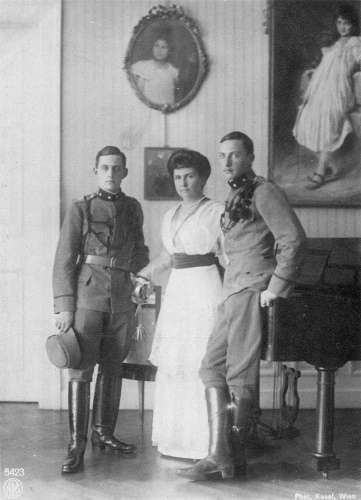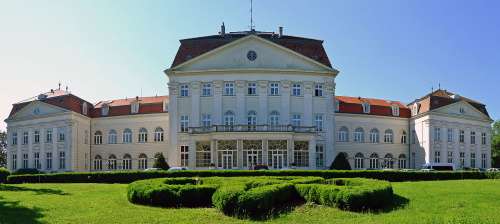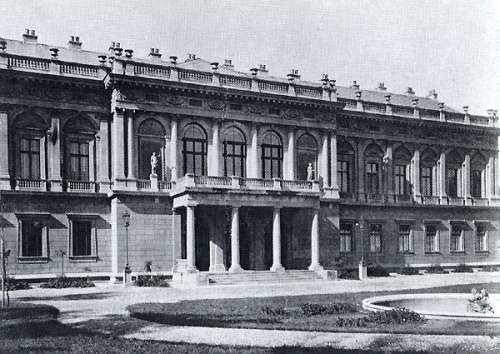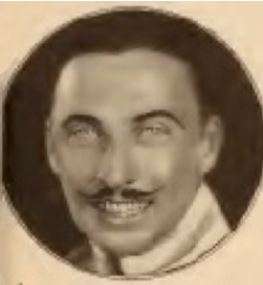Who Do We Think We Are??
"Archduke Leopold Of Austria"
The Connecticut Factory Worker Who Might Have Been King
Archduke Leopold of Austria, Prince of Tuscany, spent most of his life in exile trying to chase down money — at least when he wasn’t at a costume ball in Greenwich, Conn., or getting arrested for drunk driving in Boston.
He was a Habsburg, a family that ruled Europe for a thousand years. At one point in his life he was first in line as a Pretender to the Throne of Spain on the Carlist branch. The grand-nephew of Emperor Franz Joseph, he stood in the line of succession to the British throne. Pretty low down – 300th at birth, then he fell further.
Come along and meet one of my ancestral Hapsburg cousins...
Royal Birth & Early Life
At the fall of Habsburg monarchy he remained in Austria and recognized
the new republic in order to marry Dagmar, Baroness von
Nicolics-Podrinska. The couple had one daughter. After divorcing his
wife in 1931, Leopold eventually emigrated to the United States where he became a naturalized American citizen under the name Leopold Lorraine, and where he remarried. He died in 1958 in Connecticut.
Leopold was born January 20, 1897 in Zagreb, Croatia, the second son of Archduke Leopold Salvator and Infanta Blanca of Spain. His father was descended from the Royal Hasburg family of Austria and his mother was descended from the Royal house of Bourbon-Spain. He had 9 siblings.
Leopold grew up in luxurious surroundings. His parents owned the Palais Toskana in Vienna, Schloss Wilhelminenberg in the Austrian countryside, a villa in Italy and a castle in Lower Austria. His father had a scientific bent, and patented a number of military inventions. Later on, those patents would throw off money when the Habsburg bank account wouldn’t.
During World War I, Archduke Leopold fought along with his older brother, Rainier, Both served as lieutenants of artillery in the Austro-Hungarian Army. At 19, Leopold distinguished himself in the Battle of Medeazza. Great-Uncle Franz Joseph I of Austria, awarded him the Order of the Golden Fleece.
Then everything went downhill.......
The Fall of the Austrian Monarchy & Life after Royalty
Austria, of course, lost World War I, and the monarchy fell. Leopold and Rainer decided to stay in Vienna and recognize the Republic, relinquishing their titles. But “archduke” made newspaper fodder, and they would always be known as such.
The Austrian government seized their Vienna home, the Palais Toskana
and subdivided it into apartments. Rainer and Leopold were allowed to live there.
The rest of the family fled to Barcelona, where they lived in a tiny house. The boys slept with their father in one bedroom, the girls with their mother in another.
In Vienna, Rainer ran a garage. Leopold went to work delivering films to theaters on a three-wheeled motorcycle. In 1925, police arrested him for running over a pedestrian. He then made the news as a police item when the New York Times reported his court appearance on April 2.
He told the court he couldn’t pay the $3 fine because he only earned $10 a month. On appeal, two workmen (probably monarchists) said the pedestrian caused the accident. Archduke Leopold didn’t have to pay the fine, but he did have to suffer the indignity of being described as an errand boy in print.
The Times also noted he had a wife and children to support. Actually, he had one daughter after his marriage in 1919 to the Baroness Dagmar Nicolics-Podrinska, a minor Croatian noble.
A New Life in America
In January 1927, the New York Times sent one of its correspondents to find Leopold in Vienna. The reporter described the obscurity into which the Habsburgs had fallen. He found Rainer in his Palais Toskana apartment, “a degenerated palace” with corridors filled with old furniture. Leopold had an address in a middle-class flat, but he had sailed for America. His wife and daughter stayed behind in Austria.
Archduke Leopold landed in Hollywood. He told the Times in the summer of 1927 that he wanted to earn enough money as an actor to return to Austria. His motive was revenge: Count Laszlo Szechneyi had insulted him.
While the archduke acted, his secretary, Alfred Neuhardt, mopped his brow for him as he perspired under the lights. Leopold apparently had difficulty playing a German officer because he couldn’t salute. He explained that he never had to salute anyone in Austria, everyone saluted him.
His film career went nowhere after he played two bit parts, one in a film by John Ford. Director Eric von Stroheim used him as an uncredited actor and technical advisor on The Wedding March. Shortly before leaving Hollywood, Leopold told Photoplay,

Archduke Leopold, right, with his brother Rainer and mother Blanca.

Schloss Wilhelminenberg

Palais Toskana

The original caption to this photo read, “Hollywood predicts that Leopold will soon become an idol in Filmdom.”
Back on the East Coast
Shortly after the New Year in 1928, the Times found Leopold in Greenwich, Conn., where his friends, Mr. and Mrs. W.H. Stumpfel, held a fancy costume ball in his honor. He continued to make the social pages at luncheons, parties and the racetrack. In 1928, the Times mentioned him along with Charles Lindbergh as attending an international polo match on Long Island.
Hungarian Prince
His fortunes seemed to brighten in 1929, when the Hungarian legation in Washington, D.C., declared him a citizen and a Hungarian royal prince. But the honor didn’t seem to help his finances. The next month his tailor sued him in Vienna for failing to pay him $1,000 for day and evening clothes.
Then a few days later he made the papers again. At a dinner before the Beaux Arts Ball in New York, he got into a fight with Julius Fleischman Holmes, a wealthy sportsman, over Mrs. Holmes.
In August of 1929, he told the New York Times he expected to ride in a steeplechase in Belmont Park.
Grand Larceny
In early 1930, Archduke Leopold lived at a fashionable Sutton Place address in New York City. He shared an office with a real estate agent, Stefan de Pomierski, a Polish count he met at a party. However, as the archduke later told police, he didn’t have an occupation.
In March, he received a subpoena in connection with the theft of the Napoleon Diamond Necklace, which belonged to his great aunt, Archduchess Maria Theresa. It was all a misunderstanding, Leopold insisted.
Maria Theresa's Geni Profile
The full story of the Diamond necklace theft:
The Napolian Diamond Necklace
In 1929, following a decline in her finances, Maria Theresa engaged two agents to sell the Napoleon Diamond Necklace, a piece inherited from her husband, in the United States. After a series of botched sales attempts, the pair finally sold the necklace for $60,000 with the aid of the great-nephew of Maria Theresa, the Archduke Leopold of Austria, Prince of Tuscany but he claimed nearly 90% of the sale price as "expenses". Maria Theresa appealed to the United States courts, ultimately resulting in the recovery of the necklace, the imprisonment of her great-nephew, and the absconding of the two agents.
In 1930 Archduke Leopold was cleared of the grand larceny charge in connection with the sale of the necklace that had been in the possession of the sister-in-law of the Emperor Franz Joseph I of Austria, Infanta Maria Theresa of Portugal. The necklace, valued at $400,000, had been a gift to an earlier Habsburg, Marie Louise, from her husband Napoléon Bonaparte.
Later Life and Death
After divorcing his wife in 1931, Leopold emigrated to the United States where he was known as "Mr. Leopold H(absburg) Lorraine".[2] In 1932 he remarried, also morganatically, Alicia Gibson Coburn (New York 20 January 1898 – New York City 25 August 1960). Their marriage remained childless and ended in divorce.
For a time Leopold sought a career in Hollywood and had several minor roles. He moved to Willimantic, Connecticut where he settled into a small house with his second wife and spent the rest of his life as a factory worker. He became an American citizen in 1953.
My 13th Cousin (twice removed), Leopold died on March 14, 1958 in Willimantic, CT, United States. His ashes are in tomb 91 of the Imperial Crypt in Vienna.
My Family Line to Archduke Leopold Haspburg of Austria
Leopold Maria, Erzherzog von Österreich-Toskana is your 13th cousin twice removed.
your father
his mother-my grandmother
her father-my great Grandfater
his mother-my 2nd great Grandmother
her father-my 3rd Great Grandfather
his mother-My 4th Great Grandmother
her mother-My 5th Great Grandmother
→Wojciech Jutrzenka Gliszczyński
her father-My 6th Great Grandfather
→Magdalena Jutrzenka Gliszczyńska/Wyszk Borzyszkowska
his mother-My 7th Great Grandmother
her father-My 8th Great Grandfather
his mother-My 9th Great Grandmother
her mother-my 10th Great Grandmother
her mother-My 11th Great Grandmother
→Anna Trzebuchowska h. Ogończyk
her mother-My 12th Great Grandmother
→Małgorzata Trzebuchowska h. Ogończyk
her mother-My 13th Great Grandmother
→Wojciech Mielżyński h. Nowina
her brother-My 14th Great Uncle
his son-my 1st cousin 14 times removed
→Anna Mielżyńska z Brudzewa h. Nowina
his daughter-My 2nd cousin 13 times removed
→Teresa Czarnkowska (Zaleska h. Dołęga)
her daughter-My 3rd cousin 12 times removed
her daughter-My 4th cousin 11 times removed
→Catherine Leszczyński h. Wieniawa
her daughter-My 5th cousin 10 times removed
→Maria Leszczyńska, reine de France et de Navarre
her daughter-My 6th cousin nine times removed
→Elisabeth de France, duchessa di Parma
her daughter-My 7th cousin eight times removed
her daughter-My 8th cousin seven times removed
→Maria Isabella di Borbone, regina consorte delle Due Sicile
her daughter-my 9th cousin six times removed
→Maria Antonietta di Borbone-Due Sicilie
her daughter-My 10th Cousin five times removed
→Karl Salvator von Österreich, principe di Toscana
her son-My 11th cousin four times removed
his son-My 12th cousin thrice removed
→Leopold Maria, Erzherzog von Österreich-Toskana
his son-My 13th Cousin twice removed
No comments:
Post a Comment